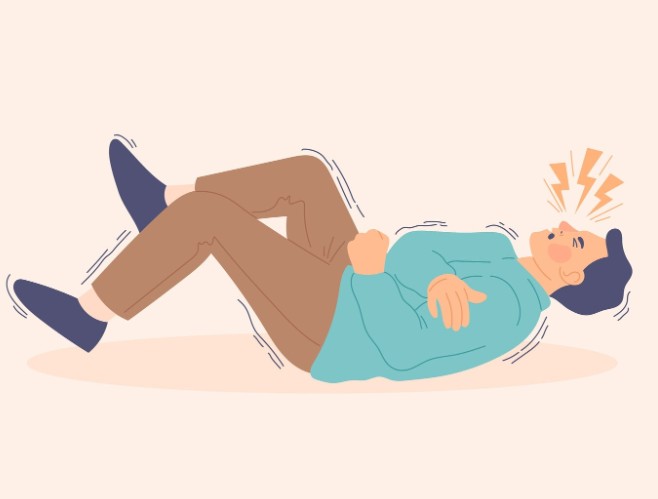What Causes Seizures? Common Triggers and Symptoms
Seizures are a sudden and often alarming medical condition that can affect people of all ages. While they may appear unpredictable, many seizures are caused by identifiable triggers and underlying neurological issues. Understanding what causes seizures, recognizing their symptoms, and seeking prompt medical care is vital for effective treatment and management. In this article, Dr. Kunal Bahrani, the best Doctor for Seizures Treatment in Faridabad, shares insights into seizure causes, types, and when to seek help.
What is a Seizure?
A seizure is a sudden, uncontrolled electrical disturbance in the brain. It can cause changes in behavior, movements, emotions, and consciousness. Seizures vary widely in severity and duration—from brief lapses in awareness to full-body convulsions.
Types of Seizures
Seizures are broadly classified into two categories:
- Focal (Partial) Seizures: These originate in one part of the brain.
- Simple Focal Seizures: No loss of consciousness; may cause twitching or sensory changes.
- Complex Focal Seizures: Involve impaired awareness and may include repetitive movements.
- Generalized Seizures: Involve both hemispheres of the brain.
- Tonic-Clonic Seizures: Loss of consciousness, body stiffening, and shaking.
- Absence Seizures: Brief lapses in awareness, common in children.
- Myoclonic Seizures: Sudden, brief jerks or twitches.
- Atonic Seizures: Sudden loss of muscle tone, causing collapse.
Common Causes of Seizures
According to Dr. Kunal Bahrani, best Doctor for Seizures Treatment in Faridabad, the causes of seizures can vary based on age, medical history, and neurological health. Here are the most common causes:
- Epilepsy
- The most common cause of recurring seizures.
- A neurological condition where abnormal brain activity leads to frequent seizures.
- Brain Injury or Trauma
- Head injuries from accidents or falls can trigger seizures, especially if the brain sustains damage.
- Infections
- Meningitis, encephalitis, and other infections that affect the brain can lead to seizures.
- Stroke
- Reduced blood flow or bleeding in the brain is a leading cause of seizures in older adults.
- Brain Tumors
- Tumors can irritate brain tissue and disrupt electrical signals, causing seizures.
- Genetic Conditions
- Some forms of epilepsy are hereditary and may be linked to genetic mutations.
- Metabolic Imbalances
- Low blood sugar (hypoglycemia), high fever, or electrolyte imbalances can lead to seizures.
- Alcohol or Drug Withdrawal
- Sudden cessation of alcohol or certain drugs may lead to seizure activity.
- Lack of Sleep
- Sleep deprivation is a significant trigger for many people with epilepsy.
- Hormonal Fluctuations
- Especially in women, hormonal changes during menstruation or menopause can trigger seizures.
Symptoms of a Seizure
Seizure symptoms can differ greatly depending on the type. However, common signs include:
- Sudden confusion or loss of awareness
- Staring spells
- Uncontrolled jerking movements
- Stiff muscles
- Collapsing or sudden falling
- Sudden emotional changes
- Temporary confusion after the episode
- Loss of bladder or bowel control
Dr. Kunal Bahrani stresses the importance of early diagnosis when these symptoms occur.
What to Do During a Seizure
If you witness someone having a seizure:
- Stay calm.
- Time the seizure. If it lasts more than 5 minutes, seek emergency help.
- Protect the person. Move away sharp objects, cushion their head, and turn them on their side.
- Do not restrain them.
- Do not put anything in their mouth.
When Should You See a Neurologist?
According to Dr. Kunal Bahrani, you should consult a neurologist if:
- You experience a seizure for the first time.
- Seizures are becoming more frequent or severe.
- You have any unexplained episodes of fainting, confusion, or body jerks.
- You’re on seizure medication but still experience symptoms.
Early consultation allows for accurate diagnosis through EEG, MRI, or blood tests, and personalized treatment can begin.
Why Choose Dr. Kunal Bahrani – Best Seizure Specialist in Faridabad?
Dr. Kunal Bahrani is renowned for his expertise in diagnosing and treating neurological conditions, especially epilepsy and seizure disorders. With years of clinical experience and advanced diagnostic tools, he provides comprehensive care tailored to each patient’s needs.
- Accurate Diagnosis: EEG monitoring, brain imaging, and neurological assessments.
- Personalized Treatment: Medication management, lifestyle modifications, and long-term care plans.
- Patient Education: Helping patients understand and manage their condition confidently.
Living with Seizures
While living with seizures can be challenging, proper management can significantly improve quality of life. Here are a few tips:
- Take medications on time.
- Get adequate sleep.
- Manage stress through yoga or meditation.
- Avoid known seizure triggers.
- Keep emergency contacts informed.
- Use seizure alert devices or bracelets if needed.
Final Words
Seizures are serious but manageable with the right care and support. If you or a loved one is experiencing seizure-like symptoms, don’t wait—early intervention is key. Dr. Kunal Bahrani, the best doctor for seizures treatment in Faridabad, is here to help you reclaim control over your health and life.

